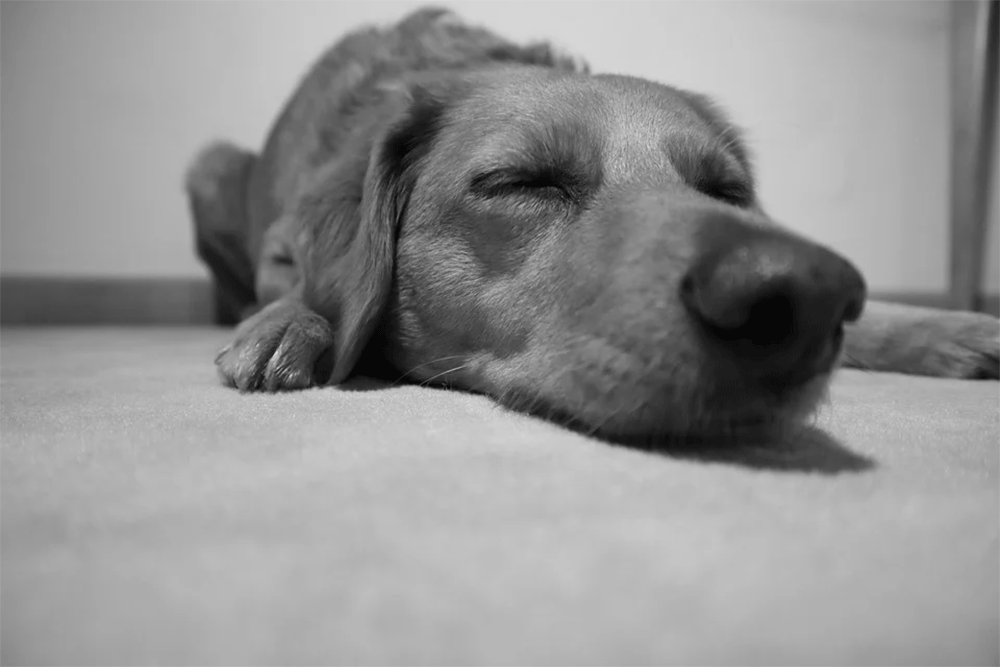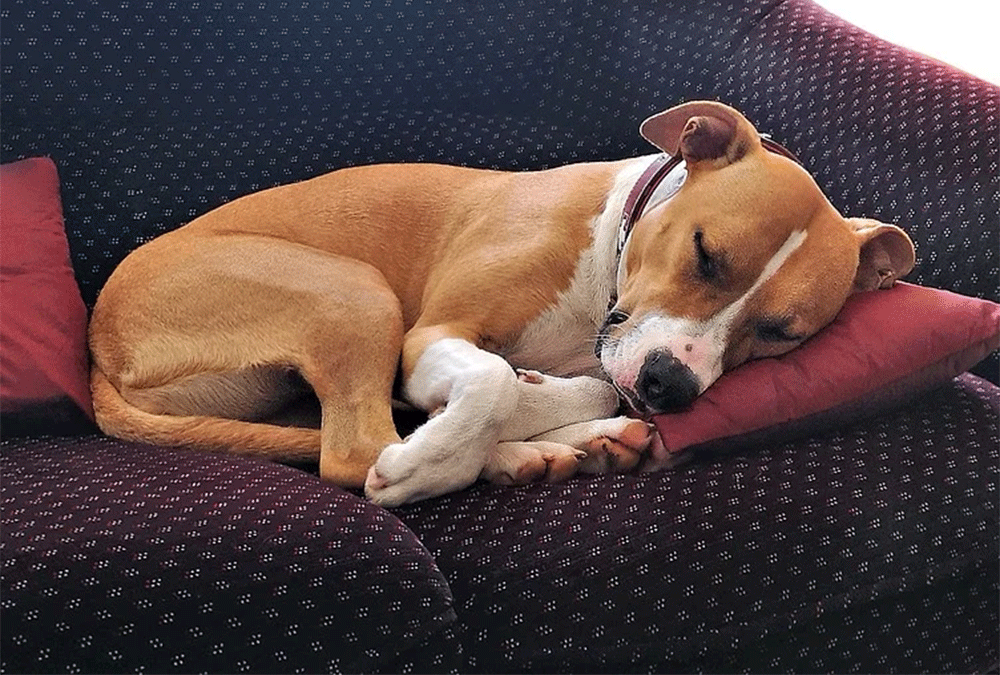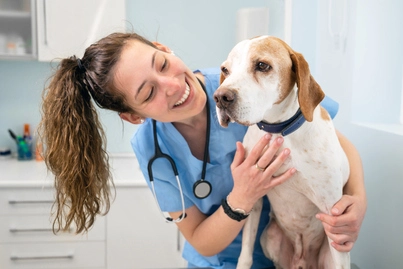If you’re an obsessed dog owner like us, then you may have studied your dog while they slept and admired how adorable they looked. Sometimes, you’ll stare for so long that you’ll begin to overanalyze or question any sounds they make or how they’re breathing in their sleep causing you great concern.
If you are concerned about how quickly your dog is breathing while they sleep, then for the most part, you don’t need to worry at all, as it’s perfectly normal, especially when they’re in a deep sleep.
Our years of experience of having dogs, conversations with veterinarians, and also our own research has helped us to develop a better understanding of how and why dogs do what they do when they sleep and we want to share our knowledge with our readers to ease any anxieties you may have regarding your pooch.
This guide will take you through everything you need to know about dogs’ breathing while they sleep, any signs you need to be aware of, and also other concerns regarding dogs when they sleep.

When is it normal for dogs to breathe fast during their sleep?
Just like us, humans, dogs fall into a deep sleep, otherwise known as rapid eye movement (REM) sleep, which is the deepest part of your sleep and normally happens within the first 90 minutes of falling asleep for humans, but within the first 20 minutes of falling asleep for our poochies.
Dogs normally stay within REM sleep for around two minutes, and in that time, you’ll be able to notice that their breathing has quickened, and you’ll be able to notice the rise and fall of their body more easily. They’ll often breathe out their nose through rapid breaths, which often sounds like they’re struggling to breathe sometimes. But we assure you, this is completely normal.
After they come out of the REM sleeping stage, you’ll often hear them do a big sigh or breathe as they return their breathing to normal.
During rapid eye movement sleep, a dog’s mind is very active, and this is the time when they are most likely to be dreaming; this is why they’ll have heightened breathing, make strange noises or even flinch their cute little paws.
If you notice your dog kicking or paddling their paws, whining, or barking in their sleep, then it just means they are having a doggy dream or nightmare; this will normally be accompanied by some rapid breathing as they’re thinking about lots of things as they sleep. These behaviors are normal, and you have no need to be concerned unless they continue these behaviors after they’ve woken up.
You should always avoid trying to suddenly wake your dog up when they’re breathing rapidly and making noises or movements during their deep sleep. If it seems like they’re having a dream or a nightmare, then don’t shout or shake them to wake up as this may take them by surprise and they could end up biting you by accident out of anxiety. If you’re worried that they’re having a bad dream, softly stroke the end of their body and whisper their name, so they know you’re there to protect them while they dream.
Soon enough, your dog should rise from their sleep with their fur on their face all messy and maybe feeling a bit disorientated from their dreams. Let them gather themselves before trying to fuss over them, as they may need a couple of minutes to come back down to earth and realize they’re no longer dreaming.
Another reason why your dog may be breathing fast during their sleep is that they’re hot and they’re trying to cool themselves down. Always try to keep your home as cool as possible so your dog can relax comfortably, especially during the night. If you live somewhere with a hot climate, then make sure your home is air-conditioned, and your dog has plenty of access to clean water to keep their temperature as level as possible.
You should also try to ensure your dog does not spend too long asleep in the sun, as they cannot sweat to cool themselves down like humans, so will end up panting very fast to do so. If your dog loves spending all day in the sunshine, then you should at least try and bring them inside for the hottest part of the day to avoid them developing sunstroke.
When to be concerned if your dog is breathing fast when they’re asleep?
If your dog is in REM sleep, they’re lying in a warm area, or if they’ve been running about before sleeping, then you shouldn’t be concerned about how fast they’re breathing when they’re asleep.
However, there are some circumstances when you should be concerned about your dog’s rapid breathing when they’re asleep. Dogs can suffer from respiratory problems like asthma, pneumonia, or even lung diseases like cancer which can cause them to have incredibly fast breathing.
Other symptoms of respiratory problems are if your dog has pale, blue gums or bright red gums or if they’re unusually drooling down their faces all the time.
Some other signs to look out for if you’re concerned about how fast your dog is breathing are if your dog is struggling to breathe, maybe they’re engaging all of their stomach muscles to help them breathe properly. If their day-to-day personality has changed and they’re suddenly very fatigued or not fussed about their water or food.
If your dog is breathing through an open mouth when they’re resting and the temperature around them is cool, this could be another sign that there is something wrong with them, and you should consider ringing your vet if this persists.
Connect with a verified veterinarian in minutes. No waiting for appointments or office hours. No high fees. Your pet's health made convenient and worry-free.
If you have a flat-faced dog like a bulldog or a pug, then you should pay special attention to their breathing when they are sleeping and in general. These dogs are at higher risk of developing breathing problems as they have narrowed nostrils and windpipes, so they cannot take in as much air when they’re trying to breathe.
What is the normal breathing rate for a dog while they sleep?
The normal breathing rate for dogs is around 15 to 30 breaths per minute when your dog is resting. If your dog has been exercising, then their breathing rate can be almost 10 times their resting rate, but this is completely normal, and their quick panting is to cool themselves down.
Your dog should be doing 30 or fewer breaths per minute when they’re sleeping, but this may be slightly increased during REM sleep. If your dog’s rapid breathing continues throughout the entire duration of their nap, then you should monitor them to see if they need to go to the vet.
Hopefully, this has cleared up any concerns you may have regarding your pooches breathing. Remember that rapid breathing whilst dogs sleep is completely normal, and if you do become concerned about the rate of your dog’s breathing, then get in contact with your vet, and they’ll be able to give you some advice or encourage you to bring your dog in for a visit.
Common Sleep-Related Concerns and Questions
Now we’ve reassured you about your dog’s breathing habits; we’ll be covering some common topics and questions that we discuss with other dog owners that we come across.
If you’re new to owning a dog then some of these will be very helpful in giving you more insight into your dog’s life
Do dogs dream, and if so, what do they dream about?
Yes, dogs do dream when they’re sleeping just like us humans. Now whilst there’s no real way to pinpoint what our dogs dream about, it’s fair to presume that they relay their regular activities like eating, playing, and chasing things around their environment.
Some animal researchers say that our dogs dream about dream scenarios, so while some dogs may dream of chasing rats, some bigger dogs, like German shepherds, are dreaming about running riot around their favorite back.
One of the easiest ways to tell if your dog is dreaming is by any noise or movement they make whilst they are sleeping. If your dog falls asleep next to you, you may often see them twitching their legs or paddling asleep if they are swimming in water. Don’t be concerned if they begin whimpering or even barking in their sleep, as they are probably having fun in their dream.
Should I wake my dog up if they’re dreaming or having a nightmare?
No, if you notice your dog is dreaming or having a nightmare, you should avoid waking them up or stirring them from their sleep as you may scare them and they may lash out by growling or even biting you, which can be especially dangerous around younger children. When possible, always leave your dog to wake up naturally from their sleep and then comfort them with a pat or a cuddle afterward.
If you feel like your dog is distressed whilst they’re having a nightmare and you’re worried, you can try stroking them to the rear of their body (preferably out of reach if they were to jump and bite you) or whispering their name a few times so they know you’re near for comfort and safety. Soon enough they’ll wake up and feel a lot better finding you by their side.
As humans, we know how horrible it is when someone suddenly wakes us from a deep sleep especially if you’ve been having a nightmare. It can take you a while to recenter yourself to your surroundings, and the same goes for dogs. You should try to leave them be as much as possible.
How long should my dog be sleeping every day?

There is no definite number of hours for how long your dog should be sleeping every day, as it will all depend on your dog’s daily routine, age, and breed.
Puppies will sleep for over 18 hours a day sometimes, and this is because they exhaust most of their energy during their hyper times, discovering new things around your home and getting used to their surroundings. Whilst it’s fun having a brand new puppy in the home, it’s important to give them the time to rest so they can rejuvenate and also progress with their puppy development.
The first few nights bringing your puppy home may be challenging as they’re not used to sleeping without their mother, but try to persevere and they’ll begin to settle into their new bedtime routine.
Old dogs will also spend a lot of their day sleeping, this is because they get tired more easily and need time to rest to recharge. A longer walk or visitors coming to the home can be tiring for an older dog, and they may have some extra time to catch up on their zzz’s.
Adult dogs will sleep for around 12-14 hours a day depending on their daily routine. If your dog has long walks throughout the day, then they may spend most of the remainder of their time napping, however, if your dog spends most of their day lazing around then you may find they sleep less.
It may seem like your dog sleeps all day every day, but most of the time they’re not sleeping. They’re just lying down and resting. Dog’s only take 20 minutes to reach a deep sleep, so will only need to nap in tiny increments throughout the day to feel recharged, whereas humans need a solid few hours to get into a deep sleep.
You know, when your dog is in a deep sleep when they start breathing heavily through their nose, they start flinching, or they don’t even flinch as you walk past them.
You should always keep tabs on your dog’s sleeping routine as it can point to any problems they may be having regarding their health and even diet. If you notice your dog is a lot more fatigued during the day and it’s not related to age, then get in touch with a veterinarian as it may be a health condition causing this like a thyroid problem.
Where is the best place for my dog to sleep?
If you own a dog, you’ll be familiar with finding your dog in strange sleeping positions in areas you’d think that they would find uncomfortable. However, dogs will normally sleep anywhere that’s warm, comfortable, or enclosed to make them feel safe.
A dog should always have their own dog bed, whether that’s in a crate or not, that’s up to you. When dogs want some alone time, they’ll often go to their bed so they can be left in peace. A comfortable bed is key for keeping your dog happy and keeping their joints in top condition.
Even though the thought of letting your dog sleep in your bed can be tempting, you should try to avoid this at all costs. Not only will this become a habit and your dog will find it hard to sleep without you, but you may also startle them if you toss and turn in your sleep.
Dog’s also do not have the same sleep routine as humans do, so you may find your dog wakes you up in the middle of the night and you may feel less rested throughout the day.
Conclusion
So to conclude what we’ve covered already, your dog breathing quickly in their sleep is very normal and you shouldn’t worry if you see them doing it.
Dog’s spend a few minutes of their sleep routine in a deep sleep, of which they will be breathing quickly. However, if this rapid breathing continues for long periods, then you should contact a vet for advice.
If your dog is acting out of character and you feel there is something wrong with their breathing, then you should contact a vet straight away as there may be respiratory problems.

